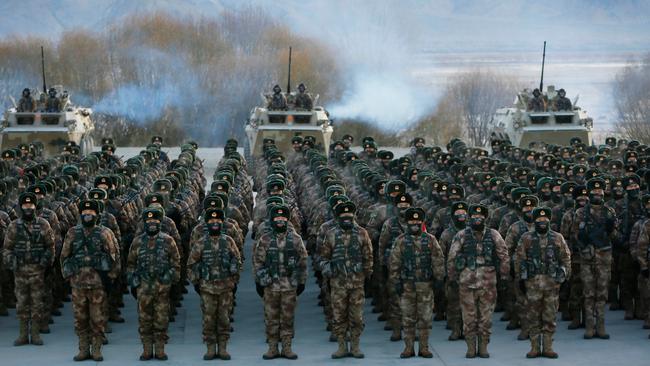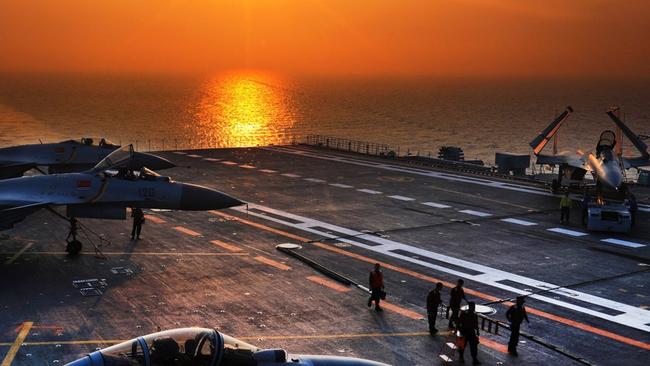Christopher Pyne: The emergence of China is the most important foreign and defence policy challenge in our lifetime
A real war is a possibility in the Indo-Pacific in the next decade, and it’s in everyone’s interest – especially Australia’s – to steer clear of it.

Opinion
Don't miss out on the headlines from Opinion. Followed categories will be added to My News.
What are the chances of a kinetic war in the Indo-Pacific? Not a cyber war, but a real one involving loss of life, destruction of military platforms with aggressors and defenders on different sides?
This is not rhetoric. This is a possibility we may well confront in the next five to 10 years. Unfortunately, the strategic defence posture of the People’s Republic of China is not as benign as it needs to be to comfort the United States and its allies.
The reality is, China is confident and capable and it is not embarrassed to show it. Hence, the government of Xi Jinping feels it can bring Hong Kong under complete control from Beijing in a way that is hadn’t until 2020.
China can stare down international criticism of its treatment of the ethnic Uighur minority in Western China. It feels strong enough to press its claims over the South China Sea. Most concerning of all, it has turned up pressure on Taiwan, the most likely next flash point in the region.
While the United States still accounts for one in every two dollars spent on the military in the world – a staggering statistic – China’s published defence spend will be US$210bn (A$275bn) in 2021.
China’s military is very capable in the event of any conflict against the US and its allies around the Western Indo-Pacific and South East Asia.
Australia is one of those allies.

For that reason and many others, avoiding any kind of war is our paramount defence and foreign policy priority as a nation. That will not be achieved by hiving ourselves off from our allies, such as the US, Japan and India. In fact, the opposite is true.
President Joe Biden’s first defence directive, the Interim National Security Guidance, specifically referenced the renewal of multi and bilateral security alliances as an priority for his administration, naming Australia as the first such relationship.
In the past few weeks, the Prime Minister of Japan, Yoshihide Suga, the Prime Minister of India, Narendra Modi, President Biden and Prime Minister Scott Morrison, came together for the first leaders meeting of The Quadrilateral.
The Quad is a dialogue. While the first leaders’ meeting focused on the four nations’ response to the coronavirus pandemic, it also reaffirmed their commitment to mutual support and a free and peaceful Indo-Pacific.
This was President Biden’s first multilateral dialogue. His White House initiated it. The Quad has been reborn in recent years, through meetings of officials and then foreign and defence ministers. India invited Australia to rejoin the military exercises known as Malabar, which also includes Japan and the US, in late 2020.
The elevation of the Quad to the incoming US President’s first multi-leader dialogue cannot be over-estimated. It is a clear signal to China that regardless of what has gone before, the Biden Administration will be returning to an engaging and orthodox foreign and defence policy.
This is welcome news for us all.
It is in no one’s interests to adopt a policy of containment of China. Rather, it is in everyone’s interests to promote a policy of engagement with China that “lifts all the boats” across our region.
Freer trade, open and transparent markets, reliable financial institutions and apparatus, more liberal movement of money and people – these features all bring about a more integrated, and therefore a likely more peaceful, region than the alternative.
That’s why I am optimistic.

Australia takes its responsibilities as an important player in the Indo-Pacific very seriously.
We are a significant economy, a longstanding and stable supporter of the international-rules-based order and a reliable friend of like-minded countries in the region. As a good international citizen, we can, and do, play an important role in emphasising our shared interests rather than conflicting ones. Our handling of the coronavirus pandemic in the past year is not the only reason our neighbours in the Indo-Pacific look to Australia as a light in the world.
A few years ago, I was the education minister in the Abbott government. I had the privilege of attending the ASEAN Plus Education Ministers Meeting in Vientiane, Laos. When I met the president, he remarked that the two largest companies operating in Laos were Australian mining companies.
He was delighted to tell me that they were popular with the government because they always paid their tax! I was proud to think that Australia was spreading to other countries the liberating opportunities given through employment, fair wages, better working conditions and fair taxation that should be the hallmark of every economy. Australians too often underestimate our influence.
Australia, traditionally, and again in recent times, has led our region on free trade, open markets and liberal economies. It was Australia that led the creation of the Asia Pacific Economic Cooperation forum in the 1980s and 90s and now, more recently, the Trans Pacific Partnership.
The world has looked to Australia on policies surrounding foreign interference, the involvement of state-owned enterprises in our 5G communications network, academic and research collaboration and multilateral economic and security engagement. This leadership will continue because Australians believe in our ability to make a difference.
The challenges we face right now in managing the emergence of China as one of the two superpowers in the world will shape our world for the next many decades.
Without doubt, it will be the most important foreign and defence policy challenge in our lifetimes. Handled well, every boat can be lifted. Handled badly, it could well lead to global catastrophe. The stakes are too high to leave to others to resolve.




